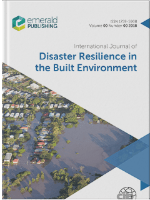
International Journal of Disaster Resilience in the Built Environment
Scope & Guideline
Transforming risks into resilient solutions.
Introduction
Aims and Scopes
- Disaster Risk Assessment and Management:
The journal explores methodologies for assessing disaster risks and developing comprehensive management strategies to mitigate these risks in the built environment. - Resilient Infrastructure Development:
Research focuses on designing and retrofitting infrastructure to withstand disasters, including studies on building materials, construction techniques, and urban planning. - Stakeholder Engagement and Community Resilience:
It emphasizes the role of various stakeholders, including government, communities, and NGOs, in fostering resilience through participatory approaches. - Climate Change Adaptation:
The journal publishes studies on adapting built environments to the impacts of climate change, including rising sea levels, extreme weather events, and urban heat islands. - Nature-Based Solutions:
Research on integrating natural systems and solutions into urban planning and disaster resilience strategies is highlighted, promoting sustainability and ecological balance. - Policy and Governance Frameworks:
The journal addresses the need for coherent policies and governance structures that support disaster resilience and sustainable development goals.
Trending and Emerging
- Smart Technologies and Disaster Management:
The integration of smart technologies, such as IoT and AI, in disaster risk reduction and management is gaining traction, reflecting the need for data-driven and efficient solutions. - Nature-Based Solutions for Urban Resilience:
There is an increasing focus on nature-based solutions, recognizing their potential to enhance urban resilience through sustainable practices and ecological restoration. - Climate Resilient Agriculture:
Research is trending towards developing agricultural practices that are resilient to climate change, emphasizing the interconnection between food security and disaster resilience. - Community-Led Resilience Initiatives:
There is a growing emphasis on community participation and leadership in resilience-building initiatives, recognizing that local knowledge and engagement are crucial for effective disaster management. - Health Infrastructure Resilience:
The resilience of health infrastructure, particularly in the context of pandemics and natural disasters, is emerging as a significant area of research, highlighting the interconnectedness of health and disaster risk management.
Declining or Waning
- Historical Disaster Studies:
Research focusing on historical disaster events and their impacts has seen a decline, as the journal shifts towards contemporary issues and future resilience strategies. - Traditional Construction Methods:
There is a waning interest in studies solely centered on traditional construction methods, as more emphasis is placed on innovative and sustainable building practices. - Single-Hazard Focus:
The journal has moved away from studies that focus solely on single hazards (e.g., earthquakes or floods) to a more integrated approach that considers multiple hazards and their interactions. - Post-Disaster Recovery:
While still relevant, research specifically focused on post-disaster recovery processes has decreased in favor of proactive resilience-building strategies. - Local Case Studies:
The emphasis on localized case studies has diminished, with more research being directed towards broader, comparative analyses that can inform global practices.
Similar Journals
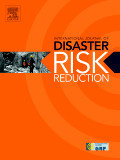
International Journal of Disaster Risk Reduction
Cultivating insights for effective risk reduction solutions.The International Journal of Disaster Risk Reduction is a leading academic publication dedicated to advancing the understanding and management of disaster risks, promoting innovative solutions and effective strategies for risk reduction. Published by ELSEVIER, this journal serves as a critical platform for researchers, professionals, and students in the fields of Geology, Geotechnical Engineering, and Safety Research. With an impressive impact factor and ranked in the top quartile (Q1) across its various categories as of 2023, it demonstrates exceptional quality and relevance in its contributions to science and engineering disciplines. The journal has been committed to disseminating high-quality research since its inception in 2012 and remains open for new submissions through 2024. The Scopus rankings reflect its prestigious position, with notable placements in Earth and Planetary Sciences and Social Sciences, highlighting its influence in shaping best practices for disaster risk governance. As an essential resource for anyone involved in disaster preparedness and mitigation, the International Journal of Disaster Risk Reduction fosters knowledge exchange and collaboration among stakeholders in the global community.

NATURAL HAZARDS
Empowering communities through informed disaster management.NATURAL HAZARDS is a premier academic journal published by SPRINGER that focuses on the multidimensional aspects of natural hazards, their impacts, and mitigation strategies. With a robust impact factor and esteemed rankings in reputable databases such as Scopus, this journal is classified in the Q2 category in Atmospheric Science and Q1 in both Earth and Planetary Sciences (miscellaneous) and Water Science and Technology, showcasing its influence in these critical fields. Established in 1988 and continuing through 2024, it serves as a vital resource for researchers, professionals, and students alike, providing cutting-edge research and insights into the dynamics of natural hazards. Although it does not offer open-access options, the journal is accessible through institutional subscriptions, ensuring that high-quality research is disseminated efficiently to those dedicated to advancing our understanding of environmental challenges. By publishing empirical studies, theoretical analyses, and case studies, NATURAL HAZARDS plays a crucial role in informing disaster management policies and strategies, thereby contributing to a safer, more resilient world.

Sustainable and Resilient Infrastructure
Driving Change: Engineering a Sustainable WorldSustainable and Resilient Infrastructure, published by TAYLOR & FRANCIS LTD, is a premier journal dedicated to the advancement of knowledge in the fields of building and construction, civil and structural engineering, and geography, planning, and development. Since its inception in 2016, this journal has established itself with an impressive Q1 ranking in multiple categories, reflecting its commitment to high-quality research and innovative practices. It occupies a distinguished position in Scopus with robust rankings across various engineering and social sciences fields, making it an essential publication for researchers and professionals aiming to address contemporary challenges in infrastructure sustainability and resilience. Although it is not an open access journal, it provides a platform for critical discussions on safety, risk, reliability, and quality in engineering, further enhancing its relevance in the academic community. As it converges on its 2024 goals, Sustainable and Resilient Infrastructure continues to be a pivotal resource for those engaged in building a sustainable future.
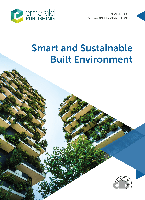
Smart and Sustainable Built Environment
Advancing sustainable solutions for modern architecture.Smart and Sustainable Built Environment, published by Emerald Group Publishing Ltd, is a prestigious journal dedicated to advancing the knowledge and practice of sustainable development within the landscape of modern architecture, building, and civil engineering. With an impact factor that reflects its strong influence and standing—illustrated by its consistent categorization in the Q1 tier across several relevant fields including Architecture, Building and Construction, and Urban Studies—this journal has become an essential resource for researchers, practitioners, and policymakers alike. Operating in the vibrant academic backdrop of the United Kingdom, it aims to publish cutting-edge research that addresses critical issues at the intersection of sustainability and built environments. The journal is also indexed in Scopus with impressive rankings, ensuring visibility and credibility. The scope of the journal encompasses a broad array of topics, encouraging contributions that discuss innovative practices, policies, and technologies to foster smart and sustainable development. With its dedication to publishing high-quality research from 2012 to 2024, Smart and Sustainable Built Environment is at the forefront of fostering dialogue and collaboration in the pursuit of sustainable solutions for our built environment.
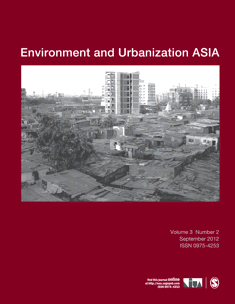
Environment and Urbanization ASIA
Charting New Territories in Urban and Environmental ResearchEnvironment and Urbanization ASIA is a leading academic journal published by SAGE Publications Ltd, focusing on the interplay between urbanization and environmental change across Asia. With an ISSN of 0975-4253 and E-ISSN 0976-3546, this peer-reviewed journal has established itself as an essential resource for scholars and practitioners alike, contributing significantly to the field of urban studies. Ranked in the Q1 category for Urban Studies in 2023 and positioned at 93rd out of 279 in Scopus, it reflects a robust percentile ranking of 66%, underscoring its impact and relevance. Published on a biannual basis, Environment and Urbanization ASIA aims to foster interdisciplinary dialogue and disseminate cutting-edge research that explores the complex dynamics of urbanization, sustainability, and environmental governance. Though it currently does not offer open-access options, its wealth of scholarly articles offers invaluable insights, making it a cornerstone for anyone engaged in addressing the challenges facing rapidly urbanizing regions in Asia. Join the community of researchers, professionals, and students dedicated to exploring innovative solutions in this critical area of study.

Blue-Green Systems
Shaping Policies for a Resilient PlanetBlue-Green Systems is an esteemed journal in the realm of environmental science, published by IWA PUBLISHING. With an ISSN of 2617-4782, this journal serves as a vital platform for disseminating cutting-edge research on the integration of blue (water-related) and green (land-related) systems, focusing on sustainable solutions to pressing environmental challenges. Since its inception in 2019, the journal has rapidly established itself as a leader in the field, ranked in the Q1 category across three domains: Environmental Science (miscellaneous), Management, Monitoring, Policy and Law, and Water Science and Technology, with impressive positions of #25/261 and #22/219 in their respective Scopus Ranks. This remarkable visibility and high impact factor reflect its commitment to advancing knowledge in sustainable management practices and policies. Researchers, professionals, and students alike can access the journal's rich content to enhance their understanding of the integration between ecological and hydrological systems, pivotal for driving innovative strategies in environmental management. Based in the United Kingdom, Blue-Green Systems contributes significantly to the global discourse on environmental sustainability and innovation, making it an essential resource for those aiming to influence future policies and practices.
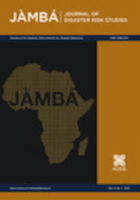
Jamba-Journal of Disaster Risk Studies
Exploring Solutions for a Safer Tomorrow.Jamba-Journal of Disaster Risk Studies, published by AOSIS, serves as a vital resource in the fields of management, monitoring, policy, law, and safety research, with an ISSN of 1996-1421 and an E-ISSN of 2072-845X. Since its establishment as an Open Access journal in 2006, Jamba has dedicated itself to disseminating high-quality research that informs and enhances disaster risk management practices, particularly within the South African context and beyond. With a robust Impact Factor and acknowledgement in the Q2 and Q3 quartiles across critical categories in 2023, Jamba ranks favorably in Scopus, notably Rank #50/109 in Social Sciences (Safety Research) and Rank #218/399 in Environmental Science (Management, Monitoring, Policy and Law). The journal's convergence over the years—from 2013 to 2024—signals its commitment to adapting contemporary challenges in disaster risk studies. Scholars and practitioners are encouraged to explore Jamba as a go-to platform for innovative insights and collaborative discussions that impact policy-making and practical applications in disaster risk reduction.

Geoenvironmental Disasters
Exploring the intersection of environment and engineering.Geoenvironmental Disasters, published by SPRINGERNATURE, is a leading open-access journal dedicated to advancing the interdisciplinary fields of environmental science, geography, and geotechnical engineering. Since its inception in 2014, the journal has made significant strides in disseminating high-quality research that addresses the challenges posed by geoenvironmental hazards and their impacts on society. With an impressive Q1 ranking across multiple categories, including Environmental Science (miscellaneous) and Geography, Planning and Development, it occupies a vital niche within the academic community. The journal’s rigorous peer-review process ensures that only the most insightful contributions are made available to a global audience. Researchers, professionals, and students are encouraged to engage with the content, which covers a wide range of topics, including disaster management, risk assessment, and stakeholder engagement in policy-making. This commitment to open-access accessibility since 2014 further enhances its reach and impact, providing a critical platform for advancing knowledge and innovation in managing geoenvironmental disasters.

Urban Water Journal
Navigating the Future of Sustainable Urban Water ManagementUrban Water Journal, published by TAYLOR & FRANCIS LTD, stands as an essential resource in the fields of Geography, Planning and Development and Water Science and Technology, reflecting its strong academic rigor and substantial contributions to urban water management and research since its inception in 2004. With an impressive impact factor indicated by its Q2 ranking in both disciplines, this journal serves as a vital platform for researchers, practitioners, and policymakers to disseminate and access pioneering studies and innovations related to urban water systems. The journal's focus extends to various aspects of urban water usage, sustainability, and policy-making, ensuring that readers are equipped with the latest findings that address pressing global challenges. Located in the United Kingdom, Urban Water Journal is committed to advancing knowledge in urban water resilience and sustainability, making it a crucial publication for those engaged in this dynamic and critical field. For researchers and professionals dedicated to impactful solutions in urban water management, this journal offers a comprehensive venue for sharing insights and fostering collaboration.

Progress in Disaster Science
Enhancing Understanding, Shaping the Future of Disaster PreparednessProgress in Disaster Science, published by ELSEVIER, is a prestigious open-access journal that has been advancing the field of disaster research since its inception in 2019. With an ISSN of 2590-0617, the journal has quickly established itself as a leading resource, recognized for its impact across various related disciplines, as evidenced by its impressive Q1 rankings in 2023 in categories such as Earth and Planetary Sciences, Environmental Science, Geography, Planning and Development, and Safety Research. This journal publishes cutting-edge research that aims to enhance understanding and management of disaster risks, resilience, and recovery processes. Additionally, the journal's accessibility ensures that important findings are disseminated widely, fostering collaboration among researchers, professionals, and students globally. Positioned under the umbrella of critical environmental and safety insights, Progress in Disaster Science plays a pivotal role in shaping the discourse surrounding disaster management and preparedness in today's rapidly changing world.